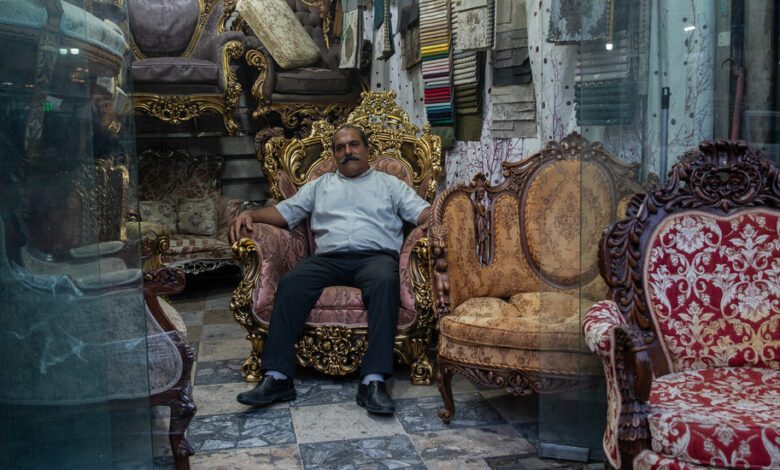Iranians’ demand for their leaders: Fix the economy

In the working-class district of Tehran around Imam Hussein Square, the side streets and alleys are lined with second-hand shops and small repair shops for refurbishing all sorts of household items. But with little to do, most shopkeepers stand around in front of their shops doing nothing.
A 60-year-old man named Abbas and his son Asgar, 32, sat in two of the secondhand, faux-brocade armchairs they sell. Asked about their business, Abbas, who did not want his last name used for fear of attracting government attention, looked incredulous.
“Just look at the street,” he said. “Business is bad. There are no customers, people are now economically weak, they have no money.”
After years of crippling US sanctions that have caused chronic inflation, compounded by Iran’s economic mismanagement and corruption, Iranians increasingly feel trapped in a downward economic spiral.
Nearly all those interviewed during the six-day reporting trip to the Iranian capital said they felt they were losing ground economically, that they were looking more at the shop windows than at the buyers, that they had to repair machines in factories because they were too expensive and that they were replacing lamb with lentils.
Even in Tehran’s posh Pasdaran neighborhood, where chic cafes serve croissants and cappuccinos and the streets are lined with sprawling Art Deco apartments, most Iranians, regardless of their political views, have one demand for their next president, who will be elected in a runoff election on Friday: Fix the economy.
When asked how her business was doing, Roya, a 25-year-old woman with a warm smile who runs a small cosmetics shop in a bazaar in northern Tehran, answered with one word: “Less.”
Still, the store seems to be thriving, with shelves full of moisturizers, mascaras, blushes and serums. What’s missing?
“There is less and less of everything: fewer customers, they buy less and the imported cosmetics come from fewer places,” she said, after asking that her last name not be used because she feared reprisals from her boss or the government.
The French and German brands, so beloved by sophisticated Iranians, have become too expensive for all but the very richest, she said.
There is also a lack of variety in the cars on Iran’s gridlocked streets. Some are the outdated products of joint ventures with European and Japanese manufacturers after sanctions were eased, or domestically produced knock-offs.
When President Donald J. Trump unilaterally withdrew the United States from the 2015 nuclear deal Iran had signed with Western powers and imposed sanctions on the banking sector and oil sales, much foreign investment also disappeared.
At the same time, the trappings of wealth are still clearly visible. Luxury consumer goods, including iPhones and designer clothes; Italian kitchenware and the latest German lamps are on sale in the malls and boutiques of northern Tehran. Construction projects are underway in many neighborhoods. And despite brutal sanctions, the government has managed to expand its advanced uranium enrichment program.
Iranians’ sense that their economic situation is deteriorating stems partly from the contrast with the period from the 1990s to 2010, when the middle class could count on their real incomes rising every year.
Since then, inflation and the weak currency have caused Iranians’ incomes and assets to decline, except for a small group of well-connected clerics and military officers, along with an elite of industrialists, property developers and high-ranking professionals who dominate the top of the economy.
While there were around 8,000 Iranian rials to the dollar in 2000, that number is now around 42,000 at the official rate and closer to 60,000 on the streets. Inflation has stabilized, but is still rising about 37 percent per yearaccording to the International Monetary Fund — a percentage that would be unthinkable in the United States or Europe.
Despite the headwinds, the country has managed to achieve economic growth of about 1.7 percent per year since 2010, when the Obama administration tightened sanctions over Iran’s nuclear program. Economists say the growth is due to rising oil production and sales, mainly to a growing market in China, according to the Congressional Research Service.
“Sanctions have cast a long shadow over the Iranian economy, but they have not led to an economic collapse,” said Esfandyar Batmanghelij, the head of the Bourse and Bazaar Foundation, an economic think tank focused on the Middle East and Central Asia. But achieving meager growth despite sanctions, he added, is little consolation for Iranians who are painfully aware of “how much is left on the table.”
The currency depreciation is so severe that when foreigners exchange, say, $100 for Iranian rials, they are given several thick wads of banknotes so large and heavy that they have to be carried in a briefcase or backpack. The government has begun introducing a new currency, the tomam, which is officially equal to 10 rials.
“Only those who have dollars feel comfortable,” said Vahid Arafati, 36, as he sat on a cobblestone square outside his small cafe, drinking espresso and freshly squeezed carrot juice with friends.
While middle-class people talk about the cost of housing and how young people are delaying marriage because they can’t afford to buy a house, less fortunate Iranians are much worse off, living on a meager monthly salary and spending an average of 70 percent of their income on rent.
During the presidential election on Friday at Masjid Lorzadeh, a mosque in a less affluent neighborhood in southern Tehran, many people spoke out angrily about the US sanctions and what they had done to Iran, while also begging the next Iranian president to pay attention to their grievances.
“I want the president to listen to my problems,” said Mina, a 62-year-old woman who, like most of the women there, was dressed in a head-to-toe black chador. “I live in a basement, I have children, they can’t find work, I need surgery, but I came to vote anyway,” she said, grimacing as she walked toward the ballot box.
There is no limit to how much landlords can increase rent, leaving people like Mina in constant fear that they will no longer be able to afford their home.
The woman next to her, Fatima, 48, a housewife, was bitterly angry, especially at the United States for the sanctions, which she blames for Iran’s economic problems. “These problems, the sanctions, they are created by our enemies, but they will not succeed,” she said. “We will put out the eyes of our enemies.”
Abbas, the chair seller, has a different view of the economy. “Look, Iran is a rich country, but that wealth is not going to the hands of the people,” he said. “I don’t know where it’s going, I’m not the government, maybe they know where it’s going, but every year it’s getting worse.”
“No president will help,” he added. “The previous president, when he came to power three years ago, a kilo of meat was 100,000 tomams. Now it is 600,000 tomams.”
A few doors down, in the workshop where the chairs Abbas sells are refurbished, the atmosphere is even grimmer.
In the back, two workers sweated on the cushions they were refurbishing, working quickly and silently. They were trained, they said, but after years of declining fortunes, their families could no longer make ends meet and they were forced to take whatever jobs they could find.
A third man, Mohamed Reza Moharan Zahre, 36, said he had finished high school and was ready to go to college, hoping to become a pilot. But his father’s carpet shop went bankrupt, so he dropped out to help out.
Now he says his only hope is to emigrate to Germany.
“A lot of my friends have left the country. It’s hard to go legally, but what choice do we have?” he said. “I earn per piece, maybe $220 a month, and $180 goes to rent. I’m single, how can I get married? Iran is not a good place to make money.”
Seddighe Boroumand, 62, a school janitor who is barely 4 feet 1 inch tall, nearly cried as she recounted how her diminishing ability to pay for more than shelter and food has affected her entire life.
“My daughter died eight months ago because I didn’t have money to buy the medicines she needed,” said Mrs. Boroumand. “She had a lung problem and couldn’t breathe, I saw her gasping. And my first son had a heart problem and he also died. He had a baby and I pay money to support his baby.”
“My third son was conscripted, but he had a physical disability and we take care of him,” she added, nodding to her husband, who works at the same school as her.
“We ask politicians to put an end to the suffering.”




